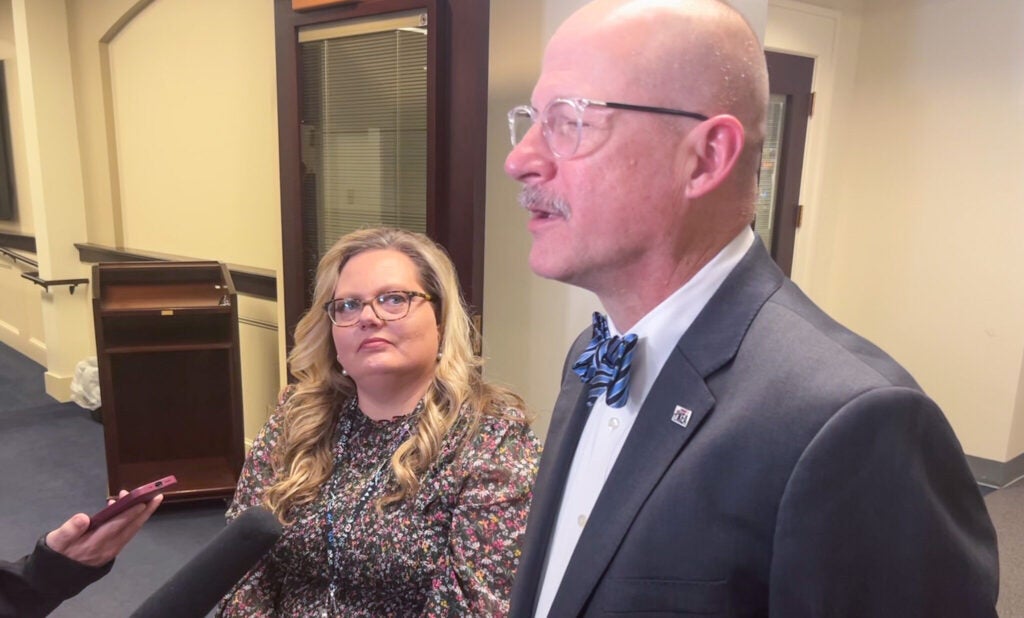Republican-backed change to teacher pay for sick days forwarded by committee
Published 12:00 pm Thursday, February 8, 2024
|
Getting your Trinity Audio player ready...
|
By McKenna Horsley
Kentucky Lantern
Despite concerns voiced by educators, a Senate committee forwarded a bill Wednesday that would change how teachers are paid for accumulated sick leave when they retire.
In an 8-3 vote, the Senate State and Local Government Committee gave a favorable recommendation to Senate Bill 4. Sponsored by Sen. Jimmy Higdon, R-Lebanon, the bill aims to implement greater cost transparency within the Teachers’ Retirement System’s sick leave program.
However, teachers representing the Fayette County Education Association and Boone County Education Association warned committee members that the changes in Higdon’s bill could cause more teachers to use their sick days throughout their career amid a growing substitute teacher shortage.
Jessica Hiler, president of the FCEA and a kindergarten teacher, said she used her sick leave early on in her career as maternity leave or to care for her children.
“As our kids get older, we can start rebuilding our leave time as we prepare for retirement,” she said. “Knowing that those leave days have value at the end of our career is an incentive to keep them instead of using them — which keeps our talented and experienced educators in the classroom every day with our kids.”
The bill would limit payment for unused sick leave days gained after June 30, 2024 to no more than 10 days per school year. After July 1 of this year, all public school districts would annually report sick leave balances of eligible employees to the Teachers’ Retirement System (TRS). Currently, 30% of the daily value for these days is paid as compensation at retirement.
The three no votes were Louisville Democratic Sens. Denise Harper Angel and Cassie Chambers Armstrong and London Republican Sen. Brandon Storm.
After the meeting, Chambers Armstrong said she was concerned about the narrative around the changes to sick days at a time when “we recognize we’re struggling to attract and retain people in this profession.”
“It is the future of Kentucky to have quality teachers in our classrooms,” she said. “And so sending the message that we’re going to take away things from our underpaid, undervalued public servants — wrong message right now.”
While explaining his vote against the bill, Storm said four House Republicans he shares Laurel County with have backed a measure in the House to address the substitute teacher shortage, House Bill 387.
The bill, which would lower qualifications to become a substitute teacher, passed out of the House Education Committee Tuesday. If it becomes law, substitute teachers would no longer be required to have at least 64 hours of college course work as long as they have graduated from high school or earned a GED.
Higdon told the committee that he believed all Kentucky teachers and administrators should have the same benefits across the state. He said the state paid off $383 million a couple years ago in sick days, which was only teachers who had then retired. Current teachers have an estimated sick day liability of $583 million which Higdon said was an estimate since the system is not alerted to a teacher’s sick days until retirement.
“My intent with this bill is to make sure that sick days are equal to all teachers and administrators across the state,” the senator said. “The sick day program has been around for a long time, and over the years, it’s kind of morphed into something that was originally meant to be 10 days a year.”
Higdon said the bill is not retroactive, meaning teachers currently in the system will retain their sick leave accrued by June 30, 2024. After that, teachers will be able to accure 10 sick days a year.
He received support on the bill from fellow co-sponsor Senate Republican Floor Leader Damon Thayer, of Georgetown, and Sen. Phillip Wheeler, R-Pikeville, during the meeting.
“Everybody wants to have a comfortable retirement and I’m generally for that, but I mean, I just don’t see where this really harms anybody since they’re going to get paid for their days,” Wheeler said. “And it really doesn’t stop at least the original intent of the program.”






